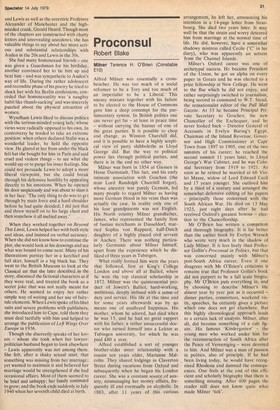Proconsul
Robert Blake
Milner Terence H. O'Brien (Constable £1 0) Alfred Milner was essentially a crossbencher. He was too much of a social reformer to be a Tory and too much of an imperialist to be a Liberal. This uneasy mixture together with his failure to be elected to the House of Commons gave him a deep contempt for the parliamentary system. In British politics one can never get far — at least in peace time — without carrying the banner of one of the great parties. It is possible to chop and change, as Winston Churchill did, and it is possible to have a highly sceptical view of party shibboleths as Lloyd George did. But the way to political power lies through political parties, and there is in the end no other way.
Milner was born in 1854 at Giessen in Hesse Darmstadt. This fact, and his early intimate association with Goschen (the man Lord Randolph Churchill forgot), whose ancestry was purely German, led many people to regard Milner as having more German blood in his veins than was actually the case. In reality only one of his four grandparents was not English. His North country Milner grandfather, James, who represented the family firm of fustian merchants in Dusseldorf, married Sophia von Rappard, half-Dutch ' daughter of a highly placed civil servant in Aachen. There was nothing particularly Germanic about Milner himself, apart from the experience which he disliked of three years in Tubingen.
What really formed him svere the years that followed, first at King's College London and above all at Balliol, where he won the top classical scholarship in 1872. Milner was the quintessential product of Jowett's Balliol, hard-working, ambitious, deeply imbued with a sense of duty and service. His life at this time and for some years afterwards was by ao means one of unalloyed happiness. His mother, whom he adored, had died when he was 15, and he had no great rapport with his father, a rather unsuccessful doctor who turned himself into a Lektor at Tubingen university, for which he was paid £80 a year.
Alfred established a sort of younger brother-elder sister relationship with a cousin ten years older, Marianne Malcolm. They shared lodgings in Claverton Street during vacations from Oxford and subsequently when he began his London career. She was a constant source of anxiety, mismanaging her money affairs, frequently ill and eventually an alcoholic. In 1883, after 11 years of this curious arrangement, he left her, announcing his intention in a 14-page letter from Strasbourg. She died two years later. It may well be that the strain and worry deterred him from marriage at the normal time of life. He did, however, have a somewhat shadowy mistress called Cecile (`C' in his diary), who was apparently an actress from the Channel Islands.
Milner's Oxford career was one of archetypal success. He became President of the Union, he got an alpha on every paper in Greats and he was elected to a prize fellowship at New College. He went to the Bar which he did not enjoy, and rather surprisingly switched to journalism, being second in command to W.T. Stead, the sensationalist editor of the Pall Mall Gazette. At 33 he became Principal Private Secretary to Goschen, the new Chancellor of the Exchequer, and he never looked back — Director General of Accounts in Evelyn Baring's Egypt, Chairman of the Inland Revenue, Governor and High Commissioner at Cape Town from 1897 to 1905, one of the two summits of his career; he reached the second summit 11 years later, in Lloyd George's War Cabinet, and he was Colonial Secretary from 1919 to 1921. As soon as he retired he married at 66 Violet Maxse, widow of Lord Edward Cecil and 17 years younger. She outlived him by a third of a century and arranged the somewhat defensive editing of his papers — principally those concerned with the South African War. He died on 13 May 1925, just eight days after he had received Oxford's greatest honour — election to the Chancellorship.
Mr O'Brien has written a competent and thorough biography. It is far better than the earlier book by Evelyn Wrench who wrote very much in the shadow of Lady Milner. It is less lively than Professor Gollin's Proconsul in Politics, hut that was concerned mainly with Milner's post-South Africa career. Even if one disagrees with Mr O'Brien's criticisms it remains true that Professor Gollin's book did not purport to be a full scale biography. Mr 9',Brien puts everything in, and by choosing to describe Milner's life almost year by year just as it occurred — dinner parties, committees, weekend visits, speeches, ho certainly gives a picture which one does not get elsewhere. But this highly chronological approach leads to a certain lack of analysis. Milner, after all, did become something of a cult figure. His famous 'Kindergarten' — the young men who worked under him for the reconstruction of South Africa after the Peace of Vereeniging — were devoted to him. And Milner was a man of passion in politics, also of principle. If he had been living today, he would have recognised Rhodesia and damned the consequences. One feels at the end of this etficient and scholarly biography that there is something missing. After 400 pages the reader still does not know quite what made Milner 'tick'.


































 Previous page
Previous page